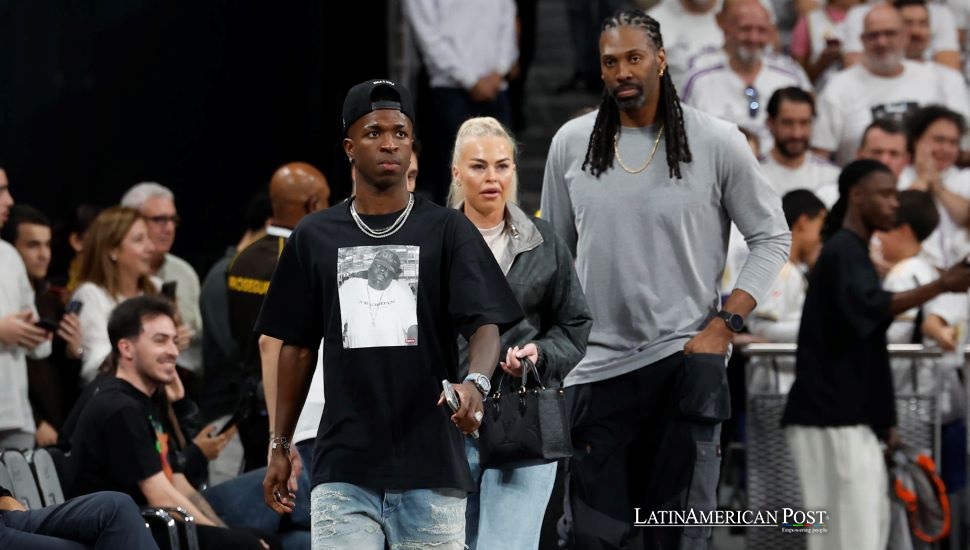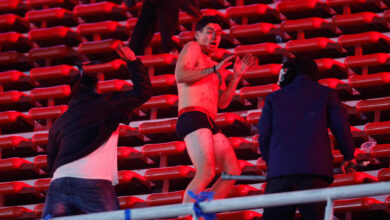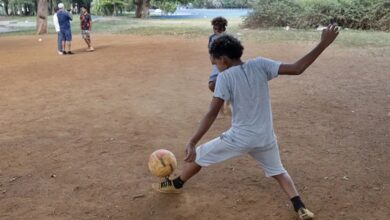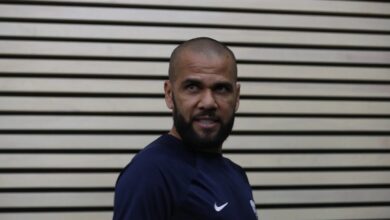Brazilian Vinicius Jr. Targeted in Racist Campaign Amid Rising Cases

The arrest of four Atlético Madrid fans for organizing a racist campaign against Real Madrid’s Vinicius Jr. highlights the ongoing racism Latin American players face in European soccer. Similar incidents raise concerns about racism in the sport and its growing impact.
Racism Strikes Again: Vinicius Jr. Targeted
On the eve of the highly anticipated Madrid derby between Atlético Madrid and Real Madrid, the headlines took a dark turn as news broke of a targeted hate campaign against Brazilian forward Vinicius Jr. Launched on the social media platform ‘X’ (formerly Twitter), the campaign called on Atlético fans to attend the match at the Metropolitano Stadium and hurl racist insults at the Real Madrid star, all while wearing masks to evade identification.
The campaign spread like wildfire, garnering over 1.7 billion views, 7,000 retweets, and nearly 56,000 interactions before authorities intervened. The Spanish National Police arrested four individuals involved in the social media hate storm, charging them with incitement to hate—a charge that may see more arrests as the investigation continues.
Though the match ended in a 1-1 draw, the tension around the abuse of Vinicius overshadowed the sporting spectacle. The game was marred by further disruptions when objects, including lighters, were thrown at Real Madrid goalkeeper Thibaut Courtois by Atlético ultras, leading to a partial stadium closure and a 3,000-euro fine.
This incident is far from isolated. In recent years, players of Latin American descent, including Vinicius, have been repeatedly subjected to racist insults and chants during matches in Spain and other European leagues. It raises serious questions about the persistence of racism in football and the measures—often seen as insufficient—that governing bodies are taking to address it.
Racism Cases Across European Soccer
Vinicius Jr. is not alone in facing this disturbing form of abuse. Across Europe, Latin American players have been regular targets of racist behavior. In January 2023, for example, during a match against Real Valladolid, Vinicius was once again subjected to racist insults, prompting widespread condemnation and further calls for action. Despite the public outrage, such incidents continue to occur with alarming regularity.
Another notable case occurred in Italy, where Colombian striker Duván Zapata faced racial abuse while playing for Atalanta. In a 2020 match against Lazio, fans directed monkey chants at Zapata, a recurring form of abuse in Italian football stadiums. Lazio’s ultras, notorious for their extremist views, have often been involved in such acts. Yet, the punishment for these behaviors remains sporadic and usually too lenient to deter future incidents.
In England, Argentine midfielder Alexis Mac Allister of Brighton & Hove Albion was the target of racist abuse on social media after his team’s defeat in a Premier League match. The abuse Mac Allister faced underscores that even in leagues with significant financial resources and global attention, racism continues to permeate the game, with social media often amplifying the problem.
The case of Uruguayan striker Edinson Cavani also serves as a reminder of the complexities surrounding racism in football. In 2020, Cavani was handed a three-match suspension and a fine by the English Football Association (FA) for using a racially insensitive term in a social media post. Cavani, who intended the message as a term of endearment, apologized, but the incident highlighted the cultural misunderstandings that can lead to accusations of racism.
These examples, alongside the continued abuse faced by Vinicius Jr., illustrate the scope of the problem Latin American players are forced to endure as they compete in Europe’s top leagues.
Spain’s Struggle with Racism in Football
The case of Vinicius Jr. and the Atlético Madrid fans is just the latest in a series of racist incidents that have stained Spanish football. While Spain is known for its passionate football culture, it has increasingly become a battleground for racism, particularly against Black and Latin American players. Despite gestures such as campaigns to “kick out racism,” the country’s football institutions have often been criticized for not doing enough to stamp out discriminatory behavior.
La Liga, Spain’s top professional football league, has attempted to address racism. After multiple incidents involving Vinicius, La Liga president Javier Tebas vowed to take more decisive action. However, these promises have yet to translate into the kind of systemic change needed to eradicate racism from Spanish stadiums truly.
The Spanish police’s arrest of the four individuals responsible for the campaign against Vinicius is an important step forward. Still, the fact that this hate campaign reached such a massive audience is a troubling sign. It shows how easily racism can spread in the digital age, especially when fans believe they can act with impunity. The incident has raised alarms not just within Spain but across international football, with calls for stricter sanctions and policies to combat racism.
The temporary suspension of the Madrid derby following the throwing of objects by Atlético fans is emblematic of how matches are becoming battlegrounds not just for competition but for the soul of the sport. While fines and partial stadium closures send a message, they are often seen as too lenient. Critics argue that harsher penalties, such as point deductions or even full stadium closures, might be more effective deterrents.
What’s Next for Latin American Players?
As racism continues to plague European football, Latin American players like Vinicius Jr. are often left to bear the brunt of the abuse. The response from governing bodies has been inconsistent, with penalties usually failing to reflect the severity of the offense. This has led many to question whether enough is being done to protect players and hold offenders accountable.
Social media platforms also play a crucial role in amplifying hate. In the case of Vinicius Jr., much of the abuse was facilitated through ‘X,’ where racist messages can spread rapidly and reach millions before authorities can intervene. While platforms have taken steps to remove harmful content, the sheer volume of racist abuse makes it difficult to prevent it entirely.
To combat this, many players and advocates call for stronger regulations on social media and within football organizations. Initiatives such as increased monitoring, harsher punishments, and mandatory anti-racism education for fans are proposed. Some suggest that clubs should be held more accountable for the behavior of their supporters, with the threat of more severe sanctions if racist incidents continue.
Meanwhile, players speak out more frequently about their experiences, using their platforms to push for change. Vinicius Jr., for example, has taken a stand against the racism he faces, publicly condemning the abuse and calling for more significant action from football authorities.
Also read: Remembering Soccer’s Darkest Day: 60 Years After Peru’s Estadio Nacional Disaster
While progress is being made, it’s clear that there is still much work to be done. The abuse faced by Latin American players in Europe reflects the state of football and is a broader societal issue that requires comprehensive solutions. Until more robust measures are taken, players like Vinicius Jr., Zapata, and Mac Allister will continue to face the ugly side of the sport, even as they excel on the field.




